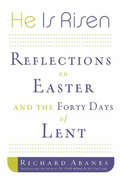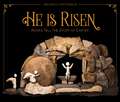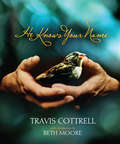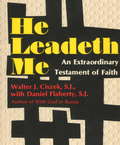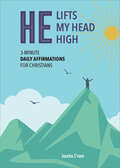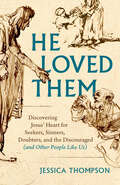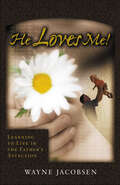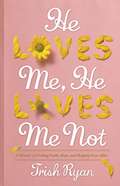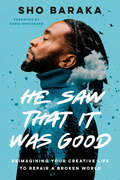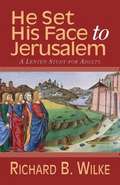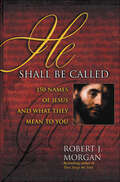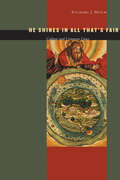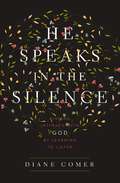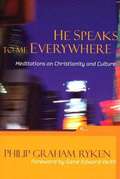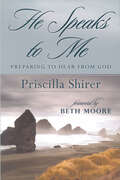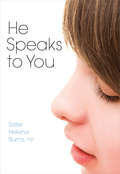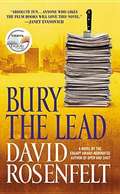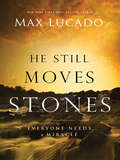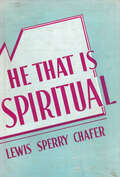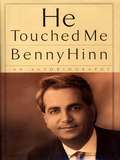- Table View
- List View
He Is Risen: Reflections on Easter and the Forty Days of Lent
by Richard AbanesIn this informative and celebratory read, Richard Abanes calls Christians to focus on the true meaning and significance of Easter. To do this, he examines different aspects of this holy day, including its origin in ?the old rugged cross,? what Lent is for, how Christians celebrate Easter worldwide, and where traditions grew from in history. While jelly beans fill children?s fancies, Abanes reestablishes the true center of Easter. Written in lively prose, ALL ABOUT EASTER is a quick read sure to please and inform Christians everywhere.
He Is Risen: Rocks Tell the Story of Easter
by ZondervanThis unique and unforgettable picture book uses rock art and simple text to tell children the story of the miracle of Easter—the resurrection of Jesus. Through the arrangement of a few rocks and powerful words directly from Scripture, the entire Easter story is told in He Is Risen: Rocks Tell the Story of Easter.Young readers will be intrigued by the nature-filled artwork that shows the death and resurrection of Jesus and the celebration of the very first Easter in a powerful and unique way. He Is Risen is perfect for:Children ages 4-8Sharing the true story of Easter in a new and memorable wayEaster giftsInspiring creative art projects using natural items such as rocks, sticks, and leavesThis unique holiday picture book:features beautiful photographs of the rock artuses the Gospel of Luke from the NKJV translation to tell the Easter storyIf you enjoy He Is Risen, check out A Savior Is Born: Rocks Tell the Story of Christmas.
He Knows Your Name: Surprised by God When You Least Expect It
by Travis CottrellAccording to Cottrell, God's goodness is predictable. His mercy is dependable. His ability to work in every moment of every reader's life, leading them to Him, is unfailing. But often in those moments, even the most devout are distracted by great distress, failing to see or acknowledge God's presence and provision. Cottrell reminds readers that God is the hope, strength and deliverance we desperately need. In every circumstance, especially those moments when we least expect it, God's voice can be heard and his presence discerned.
He Leadeth Me
by Walter J. CiszekHe Leadeth Me is the deeply moving personal story of one man's spiritual odyssey and the unflagging faith which enabled him to survive the horrendous ordeal that wrenched his body and spirit to near collapse. Captured by the Russian army during World War II and convicted of being a "Vatican spy," American Jesuit Father Walter J. Ciszek spent some 23 agonizing years in Soviet prisons and the labor camps of Siberia. He here recalls how it was only through an utter reliance on God's will that he managed to endure. He tells of the courage he found in prayer-a courage that eased the loneliness, the pain, the frustrations, the anguish, the fears, the despair. For, as Ciszek relates, the solace of spiritual contemplation gave him an inner serenity upon which he was able to draw amidst the "arrogance of evil" that surrounded him. Learning to accept even the inhuman work of toiling in the infamous Siberian salt mines as a labor pleasing to God, he was able to turn adverse forces into a source of positive value and a means of drawing closer to the compassionate and never-forsaking Divine Spirit. He Leadeth Me is a book to inspire all Christians to greater faith and trust in God-even in their darkest hour.
He Lifts My Head High: 3-Minute Daily Affirmations for Christians
by Jaseña S’vaniStart each and every day with God. No matter how busy we are or how far we wander, God is there to lift us up—every single day. He Lifts My Head High includes a year of daily affirmations to help you find time to connect with God regularly. It only takes a few minutes to feel uplifted, strengthen your faith, and reflect on all the good He brings to your life. This collection of daily affirmations includes: Daily affirmations—Spend 3 minutes a day with an inspirational verse, hymn, or faith-based quote, each accompanied by a brief and insightful reflection. Monthly devotionals—Start every month with a longer devotional centered around a unique theme of faith. Carry it with you—Take this small book with you wherever you go so that you can find encouragement with its daily affirmations throughout the day. Make time for God's graces every day with the help of these daily affirmations.
He Loved Them: Discovering Jesus' Heart for Seekers, Sinners, Doubters, and the Discouraged (and Other People Like Us)
by Jessica ThompsonDowncast, Dejected—even the Dead—find themselves in the wake of Jesus&’ love.Just who exactly did Jesus love? Author Jessica Thompson intimately engages the gospel narratives and helps the reader explore who and how Jesus loves. What does Jesus have to say to the Doubter or the Denier? How does he address the Discouraged, the Fearful, or the Outcast? Have you ever felt Forgotten or Faint-hearted? Ever needed Spiritual or Physical healing? He Loved Them shows the interactions of Jesus with real people who have real needs, struggles, and pain. As we contemplate Jesus&’ heart and actions toward the lost and brokenhearted characters in the Bible, we begin to know more fully how God feels toward us—we experience how Jesus comes alongside and loves us in our own doubt, fears, and need for healing. Thompson begins this journey with the humanity of Jesus. She explores Jesus&’ relationship with the Father and with creation. She looks in depth at how He Loved Them and joins the biblical stories to how he loves you!
He Loves Me!: Learning to Live in the Father's Affection
by Wayne Jacobsen“I cannot recommend a better follow-up to The Shack than this book. It is an exploration and adventure into the heart of the God we hoped was truly there.” —Wm. Paul Young, #1 New York Times–bestselling author of The ShackSo many Christians believe God’s love is fickle: when they sin, He turns away in disgust and anger. They vacillate between “He loves me” and “He loves me not” because of their behavior. That reasoning, writes Wayne Jacobsen, is as flawed as pulling petals from a daisy. Rather God’s love is sturdy, enduring, and undisturbed by people’s failings because God loves humankind not for what they do—but who they are. They are God’s beloved creation.Startlingly honest and empathetically written, He Loves Me! reveals the facts of God’s relentless grace. Readers will learn how to live consciously, confidently in this love all the time. Questions for personal reflection and group discussion help make these truths practical and life-changing. Insecure Christians ready for a revolutionary relationship with God will find out just how accessible that is.“Be prepared to know God better and love Him more. You hold in your hands a classic.” —Gayle Erwin, author of The Jesus Style
He Loves Me, He Loves Me Not: A Memoir of Finding Faith, Hope, and Happily Ever After
by Trish RyanTrish Ryan was the quintessential successful thirtysomething woman -- she had a career as an attorney, a nice car, and a succession of men clamoring for her affection. But despite all her accomplishments, the things by which she defined her life continually left her disappointed, especially when it came to dating. Like the heroines of chick-lit novels and Sex and the City, she couldn't escape her bad luck with men: men who cheated, who left her, who made her a lesser version of herself. After years of trying everything out there to make love work -- new age philosophy, feminist empowerment, myriad of self-help programs -- she finally, hesitantly, decided to give God a try. This is Ryan's story of how her search for the right guy turned into the search for the right God, and (spoiler alert!) how she ended up with the happily-ever-after ending.
He Saw That It Was Good: Reimagining Your Creative Life to Repair a Broken World
by Sho BarakaA deep exploration of the intersection of faith, creativity, and justice from acclaimed hip-hop artist and creative polymath Sho Baraka &“Sho has the courage to say what many are thinking and the candor to say what many are not. His words have positively influenced me for years—now this book gives the world that influence.&”—LecraeYou were created to help bring truth and beauty into this broken world. God made you with an imagination and a yearning for justice. No matter your calling or vocation, you can help shape a better world around you through your creativity. But that doesn&’t mean it will be easy. We are surrounded by toxic stories and bad cultural thinking. We&’re held back by incomplete theology. But does it have to be like that? Is frustration the end of the story?In the face of confusion and injustice, we can lose sight of our true narrative—the one that started in a garden and wants to make our real lives better today. In He Saw That It Was Good, activist and recording artist Sho Baraka wrestles deeply and honestly with these questions, gives you permission to do the same, and shows a hard-earned path to creative change. With Sho, you&’ll engage with art, justice, and history. Learn from the powerful principles of historic movements, explore why it&’s important to cultivate your creative calling (no matter what you do!), and discover a fresh look at how the gospel can transform how you see God, your neighbor, your work, and your world. You&’ll return to your biggest and truest story. Your life (and your world) need never be the same.
He Set His Face to Jerusalem: A Lenten Study for Adults
by Richard B. WilkeAdapting from Luke 9:51, Richard Wilke looks at Jesus’ journey to Jerusalem in order to help us think about how we set our faces in life. What are our goals as people of faith? What are we resolute or determined about in our lives? As we "set our faces" to Jerusalem and to the ministry, crucifixion, and resurrection of Jesus, what difference does it make? What does Jesus’ determination say to us about our commitments and about our need to grow in love of God and neighborThe 40 days of Lent are ideal to use this study and for readers to set their faces toward Easter. Study includes seven sessions, one for each Sunday in Lent and Easter Sunday. Each session features a Scripture reference, a personal reading, questions for personal reflection or group study, and closing prayer.
He Sets the Captive Free
by Corrie Ten BoomDesigned to guide prisoners toward the Christian life, this book presents a number of the author's own experiences in three of the world's most brutal prisons and concentration camps. Also included are conversations that ten Boom had with men and women in various prisons that she traveled to following her own miraculous release. This devotional presents numerous aspects of Christian living including salvation, guilt and sin, finding joy, and the fruit of the Spirit.
He Shall Be Called: 150 Names of Jesus and What They Mean to You
by Robert J. MorganBestselling author and pastor Robert J. Morgan explores the many character traits of Jesus, as shown by his many names.
He Shines in All That's Fair: Culture and Common Grace
by Richard J. MouwHow do Christians account for the widespread presence of goodness in a fallen world? Different theological perspectives have presented a range of answers to this fundamental question over the centuries. In He Shines in All That's Fair Richard Mouw brings the historic insights of Calvinism to bear on this question and reinterprets them for a broader audience at the turn of the twenty-first century. Mouw examines long-standing Reformed arguments between those who champion the doctrine of common grace and those who emphasize an antithesis between the church and the world. Defenders of common grace account for the goodness in the world by insisting that God's grace goes beyond salvation to more general gifts of beauty, virtue, and excellence to all human beings -- including those who do not believe in God. Those who reject the doctrine of common grace, on the other hand, emphasize the fallenness of the world and the need for the church to maintain a dramatic contrast to it. These divergent theological perspectives, while seemingly remote and abstract, lead to questions with very practical implications: What common ground do Christians share with those outside the faith? How should Christian treat their non-Christian neighbors? How should Christians relate to the world around them? Does God disapprove when Christians form close friendships with people who are "of the world"? Ought Christians to identify with the joys and sorrows of those who do not confess Christ as their Savior and Lord? In the course of this book Mouw looks at these topics, connecting the larger theological discussions to pressing issues in contemporary society. He insists that we have much to learn from thinkers who have rejected the idea of common (non-saving) grace, but he also defends the traditional common grace teachings, showing how they provide an important basis for wrestling with key challenges in present-day culture. Ultimately, Mouw argues forcefully for a Calvinism that is capable of standing in awe before the mysteries of God's gracious dealings with all human beings -- and indeed the whole creation. Presented as the 2000 Stob Lectures at Calvin College and Calvin Theological Seminary, these soundly reasoned, elegantly written chapters offer an updated, robust understanding of common grace that will be of great value to anyone interested in the relation of church and culture.
He Speaks in the Silence: Finding Intimacy with God by Learning to Listen
by Diane ComerHe Speaks in the Silence is about Diane Comer’s search for the kind of intimacy with God every woman longs for. It is a story of trying to be a good girl, of following the rules, of longing for a satisfaction that eludes us. Disappointed with all Diane had been told was supposed to fulfill her, she begged God in desperation to give her more. And He did. But first He took her through a trial so debilitating it almost destroyed what little faith she had. He let her go deaf. Using vivid parallels between her deafness and every woman’s struggle to hear God, this book shows women not only how Diane, as a deaf woman, hears in everyday life, but also how she can learn to listen to God in the midst of her own loud life, finding intimacy with God and the deep soul satisfaction she longs for.
He Speaks to Me Everywhere: Meditations on Christianity and Culture
by Gene Edward Veith Philip Graham RykenFifty meditations examine our culture from a Christian perspective. Covers nine topics, including the family, sports and leisure, politics, feasts and festivals.
He Speaks to Me: Preparing to Hear the Voice of God
by Priscilla Shirer&“When we approach God humbly and bow down before Him, we put ourselves in a position to hear from Him.&”Are you longing to hear God&’s voice, but feeling disconnected?God wants to speak directly to each of His beloved children, not to just a few &“spiritual elite.&” Priscilla Shirer looks at God&’s call to Samuel and uncovers six characteristics essential for hearing from God: A simple RELATIONSHIP, unfettered by sin or prideA single-minded WORSHIP, focused on God and His gloryA set-apart HOLINESS, determined to live a life that honors HimA still ATTENTIVENESS, willing to be silent before HimA sold-out HUNGER, passionately pursuing God&’s presenceA servant SPIRIT, submitted to God&’s callHer warmth and honesty, combined with a wealth of practical help, will inspire you to cultivate these traits in your own life. By doing so, you will prepare yourself to draw closer to Him and to hear His voice more clearly.
He Speaks to Me: Preparing to Hear the Voice of God
by Priscilla Shirer&“When we approach God humbly and bow down before Him, we put ourselves in a position to hear from Him.&”Are you longing to hear God&’s voice, but feeling disconnected?God wants to speak directly to each of His beloved children, not to just a few &“spiritual elite.&” Priscilla Shirer looks at God&’s call to Samuel and uncovers six characteristics essential for hearing from God: A simple RELATIONSHIP, unfettered by sin or prideA single-minded WORSHIP, focused on God and His gloryA set-apart HOLINESS, determined to live a life that honors HimA still ATTENTIVENESS, willing to be silent before HimA sold-out HUNGER, passionately pursuing God&’s presenceA servant SPIRIT, submitted to God&’s callHer warmth and honesty, combined with a wealth of practical help, will inspire you to cultivate these traits in your own life. By doing so, you will prepare yourself to draw closer to Him and to hear His voice more clearly.
He Speaks to You
by Helena BurnsDiscerning your vocation can be difficult. But endowed with the spiritual guidance contained within this book, and with Jesus as your lifelong coach, you'll be on your way.
He Started the Whole World Singing: A Treasury of Gaither Christmas Songs, Reflections, and Holiday Traditions
by Gloria GaitherWhat better way to capture the spirit of this glorious season than this offering of a Gaither family Christmas? Gloria Gaither's Christmas lyrics quickly become everybody's favorite songs of the season. Here Gloria explores the meaning behind the lyrics and the stories of how they came to be written. And for a real treat, Gloria shares eighteen of her favorite seasonal recipes sure to make your mouth water. In this ideal Christmas celebration, you can almost hear the fire crackling, smell the turkey and cinnamon buns baking-and, just maybe, notice the swish of angel wings.
He Still Moves Stones
by Max LucadoIt's what happens when obstacles prevent you from seeing what God has done for you ... He still moves stones. People with questions. The Bible is absolutely full of them. A crook on a cross. A wild man in a cemetery. A five-time divorcée. A despondent cripple. A grieving sister. A father at the end of his rope. Why are these portraits in the Bible? So we can look back in amazement at what Jesus did? No ... these aren't just Sunday school stories. They are historic moments in which a real God met real pain so we could answer the question. "Does God care when I hurt?" On every page of this powerfully moving book, Max Lucado reminds us, the God who spoke to Moses at the burning bush still speaks loudly to you today. The God who forgave King David still offers you forgiveness. The God who helped men and women in ages past still comes into your world, and he comes to do what you can't, to move the stone away so you can see his answer.
He Still Moves Stones
by Max LucadoPeople with questions. The Bible is absolutely full of them. A crook on a cross. A wild man in a cemetery. A five-time divorcTe. A despondent cripple. A grieving sister. A father at the end of his rope.Why are these portraits in the Bible? So we can look back in amazement at what Jesus did? No ... these aren't just Sunday school stories. They are historic moments in which a real God met real pain so we could answer the question. "Does God care when I hurt?"On every page of this powerfully moving book,New York Times best-selling author Max Lucado reminds us that the God who spoke to Moses at the burning bush still speaks to you today. The God who forgave King David still offers you forgiveness. The God who helped men and women in ages past still comes into your world, and he comes to do what you can't, to move the stone away so you can see his answer.
He That Is Spiritual
by Lewis Sperry ChaferA book on the Holy Spirit and the life of an effective Christian by a past president of Dallas Seminary.
He That Is Spiritual
by Lewis Sperry ChaferHe That Is Spiritual defines true Christian living and unpacks the Bible concerning spirituality: what it is and how it is secured.
He That Is Spiritual
by Lewis Sperry ChaferHe That Is Spiritual defines true Christian living and unpacks the Bible concerning spirituality: what it is and how it is secured.
He Touched Me
by Benny HinnThis is the remarkable story of Benny Hinn-a man known to millions as one of the great healing evangelists of our time. Many who have attended his crusades, watched his daily television ministry, or have seen him on programs such as Larry King Live have asked, "Who is this man? And how did he rise to such a place of prominence?"You'll travel to Jaffa, Israel, and learn of the events that shaped the life of Benedictus, the oldest son in a family of eight children of Greek and Armenian heritage. And you will read of the deep conflicts in the Hinn household when, after the family immigrated to Canada, Benny had a dramatic, life-changing spiritual experience.The journey from a small church in Oshawa, Ontario, to the largest stadiums and arenas in the world is filled with love, laughter, and tears. It is also a story of miracles.He Touched Me, the autobiography of Benny Hinn, will inspire you. It reveals what can heppen when one person becomes totally yielded to the holy Spirit.
